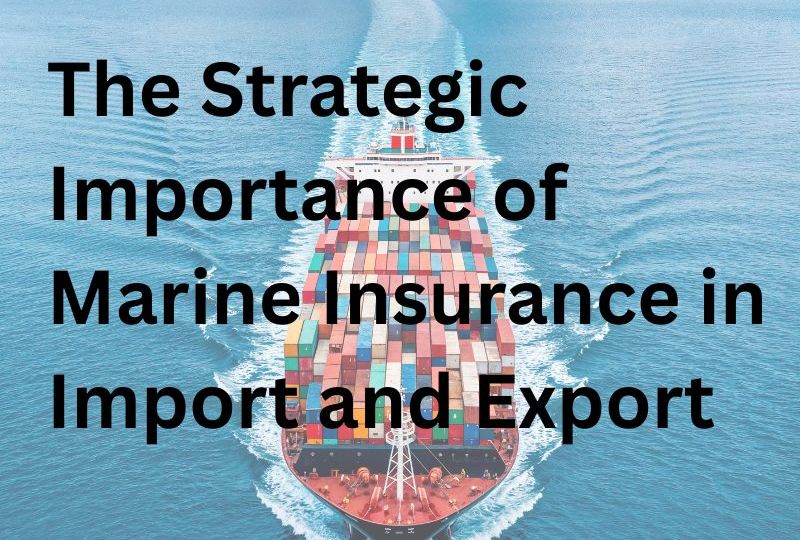
The success of businesses depends on the smooth movement of goods across continents. From smartphones and clothing to machinery and raw materials, billions of products are shipped across oceans every single day. For companies involved in import and export, international shipping is the backbone of their operations. As global trade opens up new markets and massive opportunities, it also comes with serious risks.
What happens if a cargo ship is caught in a storm and your goods are lost at sea? What if your containers are damaged during loading or unloading? Or if your shipment is stolen at a foreign port? These aren’t just hypothetical questions. They are real challenges faced by businesses every day. And when things go wrong in international shipping, the consequences can be devastating. It leads to delayed deliveries, lost profits, broken contracts, and even damaged business relationships.
Marine insurance might sound like just another cost on your shipping bill, but it’s one of the most strategic tools in international trade. It protects your peace of mind, business continuity, and smart risk management. In this blog, we’ll explore why marine insurance is essential. We’ll break down its benefits, how it supports international trade, and why smart businesses treat it as a crucial part of their strategy.
What is Marine Insurance?
It is designed to cover the loss or damage of ships, cargo, terminals, and any transport in which goods are transferred between points of origin and final destination. It includes coverage for:
- Cargo loss or damage
- Vessel damage
- Delays due to unforeseen events
- Liabilities arising from maritime accidents
It can be broken down into several types:
- Cargo Insurance: Covers goods while in transit
- Hull Insurance: Covers the ship itself
- Freight Insurance: Protects against loss of freight revenue
- Liability Insurance: Covers legal liabilities arising from damages or injury
Marine Insurance: A Strategic Business Move
1. Mitigates Financial Risk
One of the most obvious but vital benefits is financial protection. If cargo is damaged, lost, or stolen during transit, the losses can be catastrophic for small to medium enterprises. Insurance ensures that companies don’t suffer massive financial setbacks due to circumstances out of their control.
For example, if a container ship is delayed due to a storm and the goods spoil or arrive late, it can help cover the financial losses. This protection enables companies to operate more confidently in global markets.
2. Facilitates Global Trade and Compliance
It is a mandatory requirement when trading internationally. Many countries and international shipping agreements require proof of insurance before goods can be moved. It ensures that both parties in a transaction are protected and that trade can proceed smoothly.
For exporters, having adequate coverage can be the key to entering new markets. Importers insist on insurance coverage to protect their supply chains, and international banks may require it before issuing trade finance or letters of credit.
3. Builds Business Credibility and Trust
Businesses that invest in proper marine insurance are seen as more reliable and professional by their trading partners. This is especially important in import and export, where trust and long-term relationships matter.
Imagine you’re a buyer importing goods from overseas. Would you rather deal with a seller who has comprehensive insurance or one who doesn’t? The former takes risk management seriously. It makes them a safer and more responsible partner. It can give your clients, banks, and logistics partners the confidence that you’re prepared to handle challenges.
4. Protects Against a Wide Range of Perils
Shipping goods across oceans exposes them to a range of threats:
- Storms and natural disasters
- Piracy
- Theft or pilferage
- Container loss
- Mechanical failures
- Port strikes or delays
- War and political instability
Insurance policies can be customized to cover many of these risks. With the right policy in place, businesses can protect their goods, regardless of the complexity of the supply route.
5. Supports Smooth Logistics and Supply Chain Continuity
Disruptions such as delays in customs, damage to goods, or missed delivery deadlines can cause ripple effects across the entire supply chain.
Maritime insurance helps to reduce the impact of these losses. For instance, if goods are delayed or rerouted, it can cover the extra transportation costs or loss due to delivery delays. This enables them to respond quickly, maintain customer satisfaction, and minimize financial harm.
6. Provides Peace of Mind for Business Owners
Running a business is already stressful. Worrying about what might happen to your shipment during a long voyage only adds to that pressure. Insurance enables business owners and managers to concentrate on growth and operations, rather than worrying about every shipment.
Knowing that your goods are covered in case of an accident or unexpected event makes it easier to take strategic risks, explore new markets, and manage larger volumes of trade.
Safeguard Your Shipments, Strengthen Your Strategy!
From financial security and legal compliance to customer confidence and global reach, marine insurance is an indispensable part of international trade. As the global supply chain becomes more complex and risk-prone, businesses that treat it as a critical component of their trade strategy will have a clear advantage. If you’re in the import-export business and haven’t already invested in the right marine policy, now’s the time.
Choose a partner who truly understands the complexities of global shipping and the critical role of insurance in trade. You can reach out to Faith Logistics. As a trusted marine insurance company in Singapore, we provide comprehensive, customizable solutions. With deep expertise in logistics and a commitment to customer success, we help businesses of all sizes trade smarter and safer.
Get in touch with Faith Logistics today to explore the right insurance for your business!

